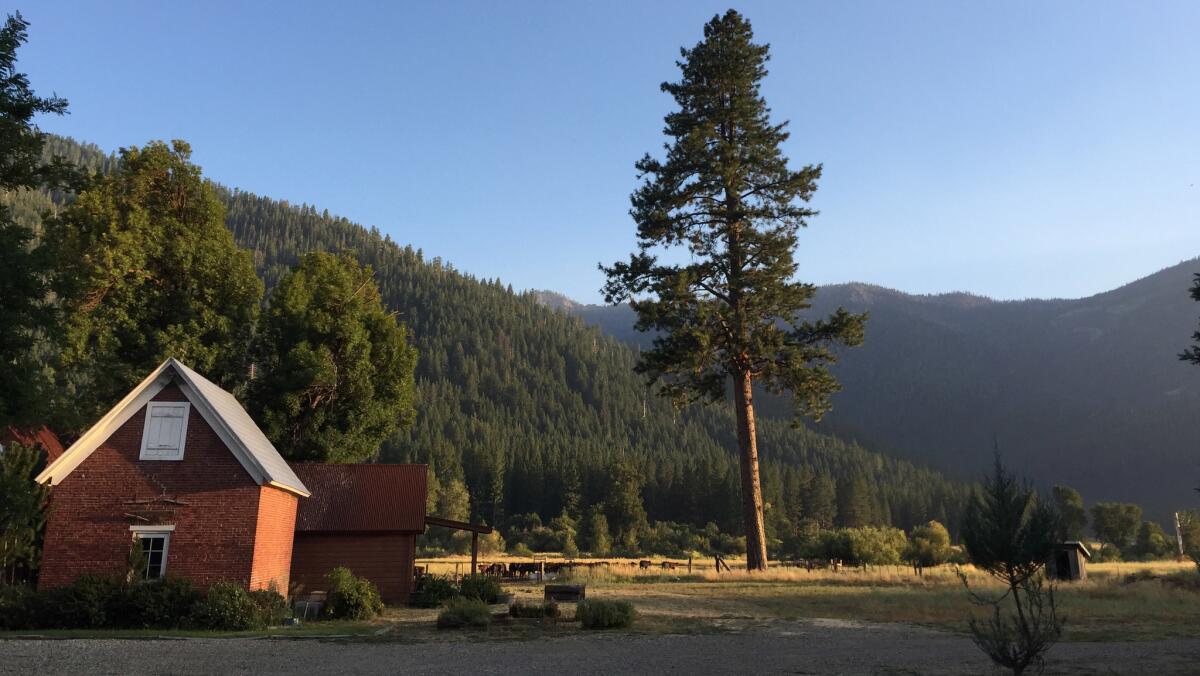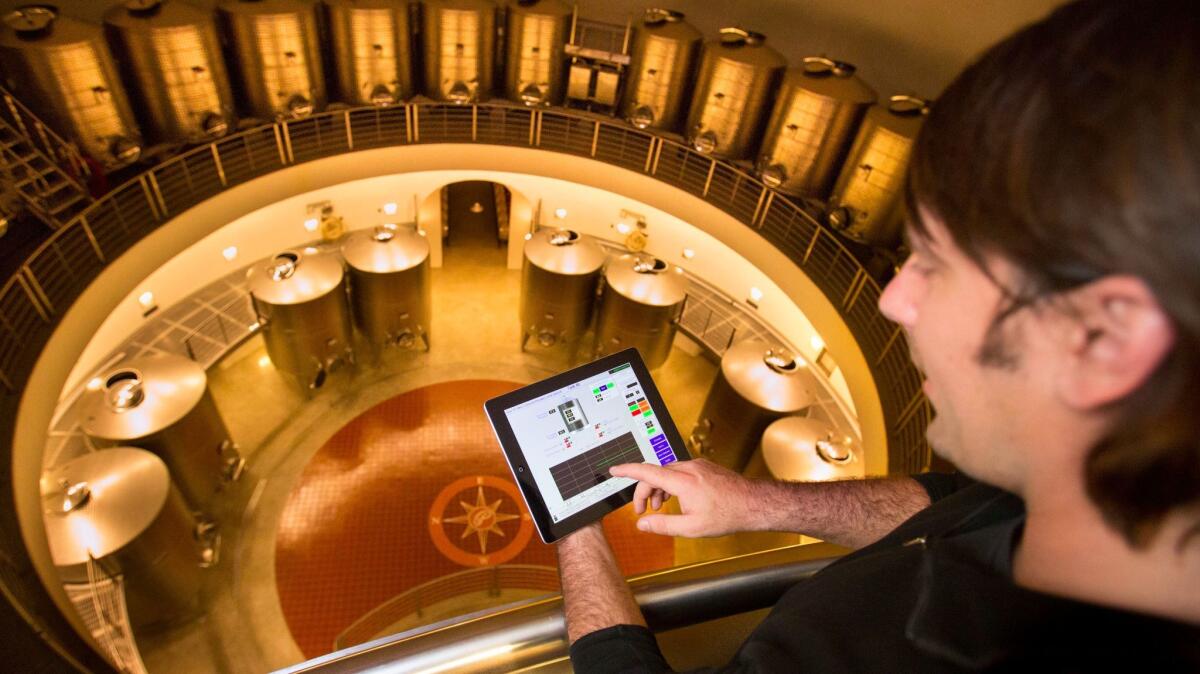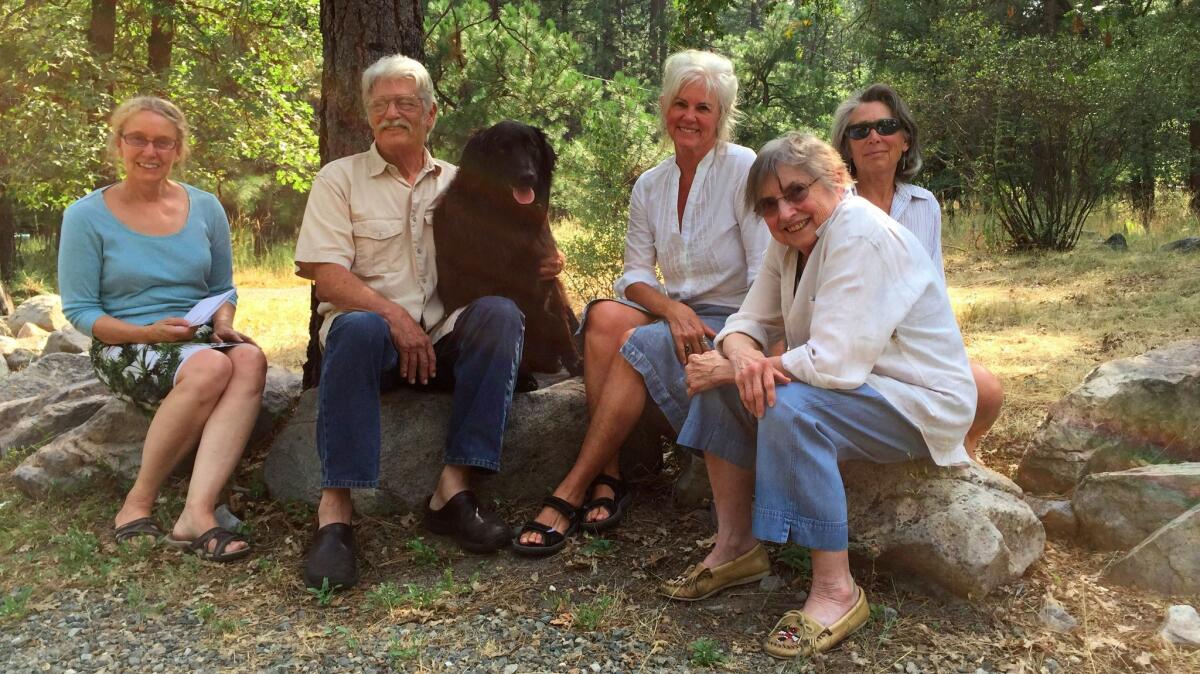In a rural Northern California valley, a development battle asks: Is a helicopter a tractor?

- Share via
The narrow, rocky road leads deep into the trees, to a grassy clearing in the Sierra Nevada where old horses graze and blackberries grow. Elisa Adler lives here. And she wants you to listen.
It’s silent, but for the wind whistling through the ponderosa pines. It’s almost always this way, she says, except when the neighbor’s helicopter comes roaring overhead.
That neighbor is Christian Gastón Palmaz, a wealthy Napa Valley vineyard operator whose father invented a heart stent credited with saving millions of lives. The Palmaz family recently bought a ranch a few miles away — practically next-door in the sparsely populated Genesee Valley — and built a small heliport.
Now, Adler and others worry that Palmaz has opened the door for more rich people to move in and build their own helipads. Land is cheap and plentiful here. What’s to stop a bunch of urbanites with serious coin from snatching up property and gridlocking the sky?
“Every place is beautiful until it’s destroyed,” Adler said. “This place hasn’t been destroyed yet.”
Compared with development battles being waged throughout California’s urban enclaves, the fight over a private heliport may seem trivial.
In Los Angeles’ Boyle Heights neighborhood, anti-gentrification protesters have declared war on art galleries. Locals in Venice bemoan the ever-growing tech company presence. In the Bay Area, where residents see a bike-share program sponsored by Ford as a symbol of gentrification, bikes have been tossed in a lake and had tires slashed.
In the Genesee Valley, people have wrestled with a question maybe only rural denizens can properly contemplate: Is a helicopter a tractor?
Plumas County officials this summer decreed that Palmaz’s twin-engine helicopter was the “functional equivalent” of a tractor, used for checking on cows, and that no special use permit or environmental review was required for the landing space. The ruling from planning director Randy Wilson said anyone who owns land that, like Palmaz’s, is zoned as agricultural preserve can build a private heliport.
Every place is beautiful until it’s destroyed. This place hasn’t been destroyed yet.
— Elisa Adler
“At one time horse-drawn agricultural equipment was common in Plumas County and the use of a tractor was an innovation,” Wilson wrote.
In September, a group of residents, including Adler, sued the county and the ranch, saying they had violated the California Environmental Quality Act and the county’s general plan.
Someone recently hung a flier outside the Quincy post office with the words “Flying Tractor’s In Plumas County????” Someone else took a marker to it, scrawling, “CRY BABY.”
Palmaz said his family has mostly been welcomed here, and that there “wasn’t much drama” until the county’s decision became official.
“I think people got nervous when they saw it in black and white,” Palmaz said. “They fear a million people are going to come with their helicopters to Plumas County, and I don’t think that’s going to happen.”

In urban California, helicopters are a part of the landscape — usually no worse than an irritant when they hover too long over a neighborhood. If L.A. had a soundtrack, it’s likely the buzz of choppers would have a starring role.
News choppers covering car chases; police helicopters immortalized in songs like Ice Cube’s “Ghetto Bird”:
“Saw a chopper with numbers on the bottom / ‘Calling all cars, I think we’ve got ’em.’ ”
The Genesee Valley is nothing like L.A.
Three hours northeast of Sacramento, unincorporated Genesee boasted a single business: a store and deli where everyone gathered to watch “Monday Night Football.” It sits amid what is now the Palmaz ranch. The store, which the Palmazes have closed for renovation, now pops up on Google Maps as “Genesee Store (Coming Soon).”
Palmaz, 33, lives primarily in the Napa Valley, where he presides over the family-run Palmaz Vineyards, a high-tech operation that’s been compared in media reports to a NASA control room and “something Bruce Wayne would run.”
He has been trying to build a private helipad on the family’s vineyard estate there too, and has met with opposition from residents who have packed public meetings wearing T-shirts reading “Heli-NO.” Two Napa County commissions have rejected that project, but the family is appealing.
Last month, the family had more to worry about than protesters when the deadly Atlas fire charred their Mt. George property but spared their vines and 1876 house.
The extended family — including Christian’s wife and son, his parents and his sister, Florencia, and her son — bought the Plumas County ranch in late 2015, Palmaz said. They promptly built the concrete pad serving as a helipad and a red, barn-like building used as a hangar.
Florencia Palmaz, 41, who runs a high-end food company with her mother, saw opportunity in the Genesee Valley’s abundant water and pristine valleys. There, she said, they could raise what she called the “luxury beef” equivalent of Napa Valley Cabernet Sauvignon.
A herd of black Japanese Wagyu cattle now graze on the 1,476-acre ranch. The plan is to sell prime cuts nationally through a members-only food club. The Genesee Store will reopen as a restaurant, Florencia Palmaz says, where they will sell burgers and sausages.
“What I see is a lot of people just very desperate for something to happen.
— Florencia Palmaz
The family is giving back to the community by providing job opportunities on the ranch, she said. The family also hopes to open a community vegetable garden at the store and have an internship program for young people.
“What I see is a lot of people just very desperate for something to happen,” Florencia said. “The population keeps declining. The youth keep leaving.”
With their big plans, Christian Palmaz says, the family needs their heliport to easily access the property and check on the cattle. He says he takes aerial images to learn the cows’ grazing patterns and to see if invasive plants are growing.
In nearby Taylorsville — a big town, compared with Genesee, with a population of about 140 — one man said he constantly hears about the heliport fight. He didn’t want to be identified because, in this tiny place, he didn’t want to seem to be taking sides.
“It’s on everyone’s minds,” he said. “There’s not a lot to talk about, and I think everybody likes to talk about it because these millionaires came out of nowhere, buying up the store.”

There are some in the valley, like retired Nevada highway patrolman Paul McGowan, who think the helipad opponents are “making a Mount Everest out of an ant hill” and that private property rights must be respected.
McGowan, whose land borders the Palmaz ranch, says motorcycles on the highway make more noise than the helicopter. “It’s a very live-and-let-live environment,” he said. “People go about their own business without wanting to be interfered with.”
On a recent day, a group of residents calling themselves the Genesee Friends — several of whom are involved in the lawsuit — gathered to talk about their concerns about the heliport. They have gathered more than 200 signatures on a petition against it.
Suddenly, Elisa Adler stopped talking. She pointed out that a Times reporter had not reacted to the sound of a helicopter in the distance — probably because she was from the city. Adler has been communicating with helicopter noise activists in L.A.
“It’s not background noise for me,” said Betsy Kramer, 80, who’s lived here for 35 years. “It’s like a gong going off. Who’s hurt? Where’s the fire?”
It’s not background noise for me. It’s like a gong going off. Who’s hurt? Where’s the fire?
— Betsy Kramer, talking about helicopters
The county where they live is mostly public forest land, but 6% — about 100,000 acres — is zoned agricultural preserve that now is open to private heliports.
Adler, 64, says she worries about the effects a bunch of helipads would have on the wildlife and mountain waterways, which provide drinking water for people as far away as Southern California.
Donald Aitken, 78, likes the slow living here, and fears that will change. “It’s hard to compete with money,” he says.
Aitken and his wife, Trish, 66, lived for years near Lake Tahoe — which, he says, was serene until the tourists, traffic and helicopter tours invaded. In 2001, they moved to their secluded house in the Genesee Valley.
“A lot of people move to places like this and leave because it’s too inconvenient,” Aitken says. “And there are people who move into a place like this and lobby for more services. There aren’t many more places like this in California.”
Twitter: @haileybranson
Sign up for Essential California
The most important California stories and recommendations in your inbox every morning.
You may occasionally receive promotional content from the Los Angeles Times.








